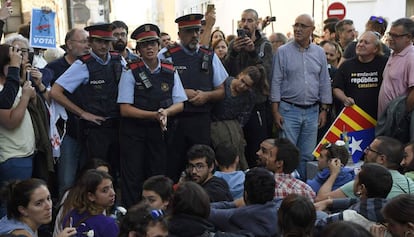Civil Guard raids Catalan government offices, arrests 14 over illegal referendum
Sympathizers rally in downtown Barcelona to protest, while regional premier calls emergency meeting
The Spanish Civil Guard launched a raid in Barcelona early Wednesday morning in search of voting material for the independence referendum that Catalan authorities plan to hold on October 1, despite its suspension by the courts on the grounds that it is unconstitutional.

Under the orders of a judge, officers entered nine government premises, including the Palau de la Generalitat – the seat of government – and the foreign affairs, economy and labor departments, according to the EFE news agency. A total of 41 searches were carried out.
Fourteen people have been arrested, according to police sources. One of them is a top Catalan official, Economy Secretary General Josep María Jové, who answers directly to the deputy regional premier, Oriol Junqueras. Among the other detainees are the regional Tax Agency secretary, Josep Maria Salvadó, and the services director from the vice-premier’s office, Natalia Garriga.
Twelve people have been arrested, including top Catalan official, Economy Secretary General Josep María Jové
As well as public officials, three citizens were also among the 14 detainees. Pau Furriol is a lawyer and was the head of the guarantee commission for Catalan nationalist party Republican Left of Catalonia. Mercedes Martínez Martos, meanwhile, is the representative of an advertising company called Fox Box Publi Alternativa. The firm owns an industrial premises in Bigues i Riells (Barcelona) where voting slips and other material related to the October 1 referendum were located. Also placed under arrest, in this case in Madrid, was Rosa María Rodríguez Curto, the general services manager of IT consultancy and services company T-Systems.
As news of the operation spread, dozens of sympathizers gathered outside the Generalitat’s economy department with pro-independence flags and fliers with slogans such as: “Let’s vote to be free.”
At 9am, protesters spilled out onto the bustling La Rambla pedestrian mall yelling “we will vote” and “independence,” Europa Press reported.
“They are attacking this country’s institutions and thus attacking its citizens. We will not allow it,” said deputy premier Oriol Junqueras, following his aide’s arrest.
They are attacking this country’s institutions and thus attacking its citizens. We will not allow it
Deputy premier Oriol Junqueras
The Catalan premier, Carles Puigdemont, called an emergency meeting of his Cabinet in response.
Spanish Prime Minister Mariano Rajoy said in Congress that “this was done on the decision of a judge to ensure compliance with the law.” Catalan deputies in the chamber walked out.
Barcelona Mayor Ada Colau tweeted that “it is a democratic scandal to search institutions and arrest public officials for political reasons. We defend Catalan institutions.”
These events represent a major escalation in the ongoing confrontation between Madrid and Barcelona over the illegal October 1 referendum.
Until now, moves to stop the ballot from taking place had been more low-key, as had been the efforts to make it happen.
Law enforcement forces in Catalonia – the Mossos d’Esquadra regional police, the National Police and the Civil Guard – were instructed on September 12 to confiscate all voting material, from campaign posters to ballot boxes.
Spain’s public prosecutor is unhappy about the way the Mossos have been acting – or failing to act – to stop preparations for the vote
But Spain’s public prosecutor is unhappy about the way the Mossos have been acting – or failing to act – to stop these preparations.
In July of this year, the Mossos chief resigned and regional authorities appointed a replacement with a public history of supporting secession.
Instead, the Civil Guard has been taking the lead in anti-referendum operations.
Regional premier Carles Puigdemont has promised that the planned ballot will be binding, no matter what the turnout and despite its lack of legal backing.
In order to provide the vote with some kind of legal framework, the Catalan parliament recently passed two controversial pieces of legislation using an unprecedented fast-track method that dispensed with regular procedural safeguards and triggered a mass walkout by non-separatist forces in the chamber. The laws were immediately suspended by Spain’s Constitutional Court.
Puigdemont and his separatist coalition, which holds a slim majority in the Catalan parliament thanks to support from a fringe party called CUP, have been intensifying their challenge to national laws by holding rallies in support of the vote, asking mayors to lend municipal premises on October 1 and notifying 55,000 citizens of their duty to go man the voting stations that day.
English version by Susana Urra.
Tu suscripción se está usando en otro dispositivo
¿Quieres añadir otro usuario a tu suscripción?
Si continúas leyendo en este dispositivo, no se podrá leer en el otro.
FlechaTu suscripción se está usando en otro dispositivo y solo puedes acceder a EL PAÍS desde un dispositivo a la vez.
Si quieres compartir tu cuenta, cambia tu suscripción a la modalidad Premium, así podrás añadir otro usuario. Cada uno accederá con su propia cuenta de email, lo que os permitirá personalizar vuestra experiencia en EL PAÍS.
¿Tienes una suscripción de empresa? Accede aquí para contratar más cuentas.
En el caso de no saber quién está usando tu cuenta, te recomendamos cambiar tu contraseña aquí.
Si decides continuar compartiendo tu cuenta, este mensaje se mostrará en tu dispositivo y en el de la otra persona que está usando tu cuenta de forma indefinida, afectando a tu experiencia de lectura. Puedes consultar aquí los términos y condiciones de la suscripción digital.








































